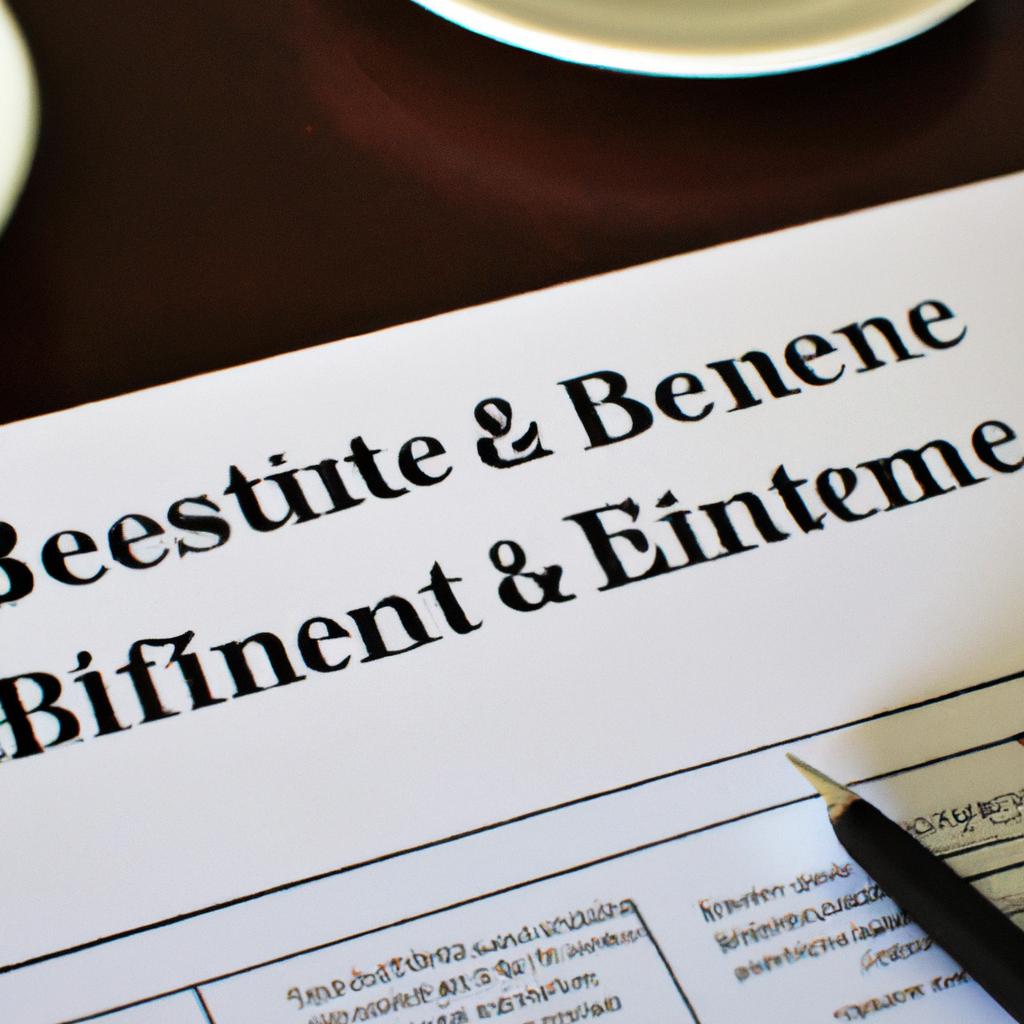When it comes to estate planning, the decision of whether to designate a beneficiary or create a will can be a critical and complex consideration. As experienced attorneys at Morgan Legal Group in New York City, we understand the significance of this choice and the potential implications it can have on the distribution of assets and the protection of your legacy. In this article, we will delve into the distinctions between beneficiaries and wills, exploring the advantages and disadvantages of each option to help you make informed decisions that align with your specific needs and goals.
Understanding the Role of Beneficiary in Estate Planning
Estate planning involves making important decisions about your assets and who will inherit them when you pass away. One key player in this process is the beneficiary. Understanding the role of the beneficiary in estate planning is essential to ensure your wishes are carried out effectively. A beneficiary is a person or entity who is designated to receive assets or benefits from a trust, will, insurance policy, or other estate planning documents.
It is important to distinguish between a beneficiary and a will. While a will outlines how you want your assets to be distributed after your death, a beneficiary is the individual or entity who actually receives those assets. This distinction is crucial in estate planning as it determines who will inherit your belongings and how they will be distributed. Beneficiaries can include family members, friends, charities, or even pets. Ensuring that your beneficiary designations align with your overall estate planning goals is essential for a smooth and efficient distribution of your assets.

Key Differences Between Beneficiary Designations and Wills
When planning your estate, it is important to understand the . While both serve the purpose of distributing assets upon your passing, they operate in distinct ways.
Beneficiary designations allow you to designate specific individuals or entities to receive assets such as life insurance policies, retirement accounts, and bank accounts directly, bypassing the probate process. On the other hand, wills outline how you want your assets distributed after your death, including who will inherit specific items or property. It is crucial to carefully consider both options and consult with an experienced estate planning attorney, like the professionals at Morgan Legal Group, to ensure your wishes are carried out effectively.

Factors to Consider When Choosing Between a Beneficiary and a Will
When deciding between choosing a beneficiary and a will, there are several important factors to consider. One key factor to keep in mind is the level of control you wish to have over your assets. With a will, you have the ability to specifically outline how your assets will be distributed after your passing. On the other hand, choosing a beneficiary means that your assets will be automatically transferred to the designated individual upon your death without the need for probate.
- Control over asset distribution
- Probate process
- Tax implications
Additionally, tax implications should be taken into account when making this decision. In some cases, choosing a beneficiary may result in lower tax liabilities compared to assets passing through a will. It is important to consult with a knowledgeable estate planning attorney to fully understand the tax consequences of each option before making a decision.

Implications of Naming Beneficiaries in Financial and Estate Planning
When it comes to financial and estate planning, the decision to name beneficiaries can have significant implications on the distribution of assets. Naming beneficiaries allows for the direct transfer of assets to the designated individuals without going through probate, providing a quicker and more efficient process. This can be particularly beneficial for those looking to avoid the time and expenses associated with probate.
However, it’s important to understand the difference between naming beneficiaries and outlining your wishes in a Will. While naming beneficiaries ensures a direct transfer of assets, a Will allows you to specify how you want your assets to be distributed, including any specific instructions or conditions. By understanding the distinctions between the two approaches, individuals can create a comprehensive estate plan that aligns with their goals and priorities.
Q&A
Q: What is the difference between a beneficiary and a will?
A: A beneficiary is a person or entity designated to receive assets or property upon the death of the account holder, whereas a will is a legal document that outlines how a person’s assets and property should be distributed after their death.
Q: Can someone be both a beneficiary and listed in a will?
A: Yes, it is possible for someone to be named as a beneficiary on a specific asset, such as a life insurance policy or retirement account, and also be listed as a recipient in a person’s will.
Q: What happens if there is a discrepancy between the beneficiary designation and the terms of the will?
A: In most cases, the beneficiary designation takes precedence over the terms of a will. This means that the assets or property allocated to the designated beneficiary will be distributed according to the beneficiary designation, regardless of what is stated in the will.
Q: Should I review my beneficiary designations and will periodically?
A: It is recommended to review and update your beneficiary designations and will regularly, especially after major life events such as marriage, divorce, birth of a child, or death of a loved one. This ensures that your assets and property are distributed according to your current wishes.
To Conclude
In conclusion, when it comes to deciding between designating a beneficiary and creating a will, it is important to carefully consider your individual circumstances and priorities. Both options have their advantages and drawbacks, so it is wise to consult with a legal professional to ensure that your wishes are carried out effectively. Whether you choose to name a beneficiary or draft a will, the most important thing is to ensure that your assets are distributed in a way that aligns with your values and intentions. Ultimately, the decision is yours to make, but with careful planning and consideration, you can rest assured that your legacy will be preserved for years to come.
 Beneficiary vs Will: Understanding the Differences, Benefits, and Importance
Beneficiary vs Will: Understanding the Differences, Benefits, and Importance
When it comes to estate planning, two common terms that often come up are beneficiaries and wills. As someone who wants to secure your assets and provide for your loved ones after you’re gone, it’s essential to understand the differences between these two terms. In this article, we’ll break down what beneficiaries and wills are, discuss their differences, and explain their benefits and importance in estate planning.
What is a Beneficiary?
A beneficiary is an individual or entity that is designated to receive assets, property, or funds from a will, trust, or life insurance policy upon the death of the original owner. Beneficiaries can include family members, friends, organizations, or charities. They can be named for specific assets or receive a percentage of the overall estate.
What is a Will?
A will is a legal document that outlines how a person wants their assets and property to be distributed after their death. It also allows individuals to name a guardian for their minor children, as well as an executor who will handle the distribution of assets according to the wishes of the deceased. A will can also include funeral arrangements and the appointment of a power of attorney.
Beneficiary vs. Will: The Differences
Beneficiary and will are two separate components of estate planning, but they work hand in hand. The main differences between them are as follows:
1. Designation of Assets
A beneficiary is designated to receive specific assets or a share of the overall estate, whereas a will outlines how all assets and property will be distributed.
2. Legal Document
A will is a legal document that must follow state laws and must be signed and witnessed to be considered valid. A beneficiary designation, on the other hand, can be included in a will but can also exist separately, such as on a life insurance policy or retirement account.
3. Execution
A will only goes into effect after the death of the person who created it, whereas a beneficiary can receive assets while the person is still alive, depending on the type of beneficiary designation chosen.
4. Power of Attorney
A will allows you to name a power of attorney who can manage your affairs while you’re alive but incapacitated. A beneficiary designation does not have this power.
5. Probate Process
Beneficiary designations generally do not go through the probate process, meaning they can be distributed to the beneficiaries relatively quickly and without court involvement. Wills, however, are subject to probate, which can be a lengthy process and may involve court fees and legal costs.
Benefits of Naming Beneficiaries and Writing a Will
While both beneficiaries and wills play essential roles in estate planning, there are some specific benefits to each that you should be aware of.
Benefits of Naming Beneficiaries
1. Avoid Probate
As mentioned earlier, assets with designated beneficiaries generally do not go through the probate process. This can save time, money, and privacy for the beneficiaries.
2. Flexibility
Designating beneficiaries allows for flexibility in the distribution of assets. You can choose specific individuals or entities to receive certain assets or a percentage of the overall estate.
3. Control Over Assets
By naming beneficiaries, you retain control over how your assets are distributed after your death. This can be particularly beneficial if you have complex family dynamics or specific wishes for your estate.
Benefits of Writing a Will
1. Specific Instructions
A will allows you to provide specific instructions for the distribution of your assets. This can include any personal or sentimental belongings, as well as who will care for your minor children.
2. Appointing an Executor
By appointing an executor in your will, you can ensure that your assets are managed and distributed according to your wishes. This can provide peace of mind and minimize conflict among family members.
3. Protecting Your Family
A will allows you to protect your loved ones by ensuring they are provided for after your death. It can also prevent potential disputes between family members by providing clear instructions and equal distribution of assets.
The Importance of Proper Estate Planning
Having a properly executed will and designating beneficiaries is crucial for the proper distribution of your assets and the protection of your loved ones after your death. Without these documents, your assets may be subject to state laws and unnecessary expenses and your family may be left to deal with complex legal processes.
Moreover, estate planning allows you to have control over your assets, protect your family, and provide peace of mind for yourself. It’s never too early to start planning for the future and ensuring your wishes are carried out after you’re gone.
Final Thoughts on Beneficiary vs Will
In summary, a beneficiary is a person or entity that is designated to receive assets, while a will outlines how assets will be distributed. Both are important components of estate planning and serve unique purposes. By understanding their differences and the benefits they offer, you can make informed decisions for the security and well-being of your loved ones. It’s always best to consult with a legal professional to ensure your estate planning documents are properly drafted and executed.


